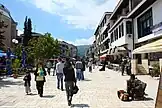Struga
Struga (Macedonian: Струга [ˈstruɡa] ⓘ, Albanian: Strugë) is a town and popular tourist destination situated in the south-western region of North Macedonia, lying on the shore of Lake Ohrid. The town of Struga is the seat of Struga Municipality.
Struga
| |
|---|---|
From the top, Aerial view of Struga, High street, Mother Teresa monument with the Mustafa Çelebi Mosque Minaret in the background | |
 Flag 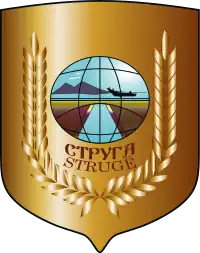 Coat of arms | |
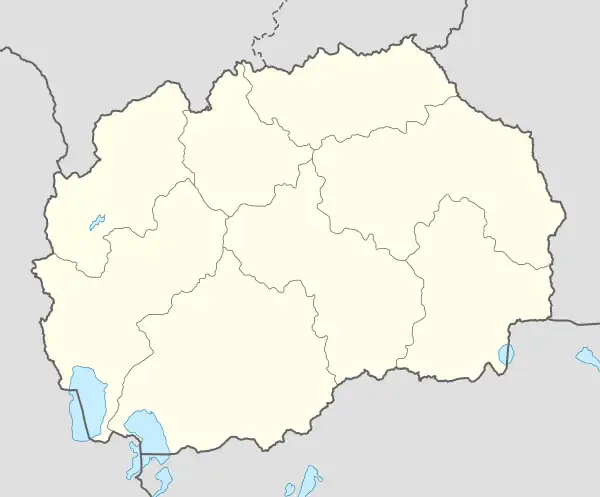 Struga Location within North Macedonia | |
| Coordinates: 41°10′N 20°40′E | |
| Country | |
| Region | |
| Municipality | |
| Government | |
| • Mayor | Ramiz Merko (DUI) |
| Area | |
| • Total | 483 km2 (186 sq mi) |
| Elevation | 693 m (2,273 ft) |
| Population (2002) | |
| • Total | 16,559 |
| Time zone | UTC+1 (CET) |
| • Summer (DST) | UTC+2 (CEST) |
| Postal code | 6330 |
| Area code | +389 46 |
| Car plates | Struga car plate |
| Climate | Cfb |
| Website | www |
Name
The name Struga was first mentioned in the 11th century.[1] It is of Slavic origin.[2][3] and means a "river bed".[4][5]
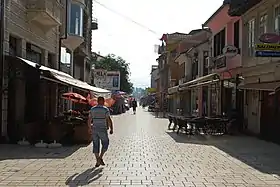
The ancient name of the city is Enchalon (Εγχαλών), the ancient Greek word for eel, which may be related to the Illyrian Enchele tribe that was known to live in the region. According to E. Hamp, a connection with Albanian ’ngjalë’ makes it possible that the name Enchele was derived from the Illyrian term for eels, which may have been anciently related to Greek and simply adjusted to the Greek pronunciation. In Polybius the word 'Enchele' is written with a voiceless aspirate kh, Enchelanes, while in Mnaseas it was replaced with a voiced ng, Engelanes, the latter being a typical feature of the Ancient Macedonian and northern Paleo-Balkan languages.[6]
History
In ancient times, the Lake Ohrid region, including Enchalon (ancient name of modern Struga) was inhabited by the Illyrian Enchele and Dassareti tribes.[7][8][9][10] The Via Egnatia ran through the Lake Ohrid region, and is believed to have passed west of Enchalon.[11]
Etymologist Qemal Murati believes that the name Strugë-a was first used as the name of a village; this name was used in a document of Tsar Dusan in the 14th century in the form of Struga. Later, in the 16th-17th centuries, the Codex of Slepçan, the name 'Strugi' was used.[12]
In the 16th century the city was visited by the Venetian Ambassador Lorenzo Bernardo who described it as a city in Bulgaria which was more akin to a small village. He describes the town as an important destination for wheat shipments and a town with fertile plains and valleys, and he speaks highly of the local eel and trout.[13]
Struga was visited by Henry Fanshawe Tozer in his travels in the Ottoman Empire, who spoke highly of the region and the Ohrid Lake which he compared to Italian lakes and to Biblical sites such as the Sea of Galilee, he considered Struga to be a head-quarters of fishery in European Turkey and that the fishery in Struga was property of the Ottoman Sultan who sublet it to locals for a large sum, he spoke highly of the endemic Ohrid trout. According to him the marshes in the region were turned into a habitable region by the Samuel of Bulgaria at the time when he made the city of Ohrid Bulgarian capital. He visited a large local Bulgarian school and mentioned the admiration that the Byzantine princess Anna Comnena had for the hundred of channels, embankments and watercourses in the city.[14]
In the late 19th and early 20th century, Struga was part of the Manastir Vilayet of the Ottoman Empire.
Struga is the home-city of the Miladinov brothers poets who played a crucial part in the Bulgarian national revival and in whose honor the Struga Poetry Evenings are held in the city.[15] Struga was also the birthplace for a number of IMARO revolutionaries such as Hristo Matov.
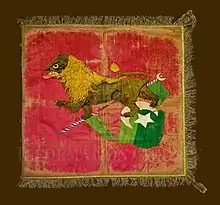
Struga was the birthplace in 1865 Ibrahim Temo, who would go on to be a doctor and one of the founders of the Ottoman reform movement known as the Committee of Union and Progress.[16]
Struga was part of the Socialist Federative Republic of Yugoslavia since 1945 as part of the Socialist Republic of Macedonia until the 1991 Macedonian independence referendum when Macedonia peacefully seceded from the federation.
Geography
Struga is located in an open valley on Lake Ohrid. The Black Drin river (Crn Drim) starts at the lake and divides the city.
Demographics
During the 16th century, Struga was located in the Sanjak of Ohrid of the Ottoman Empire. It was registered as a Christian village in the Nahiya of Ohrid with 184 Christian families, 20 unmarried men and 36 widows, as well as 8 Muslim families.[17]
In statistics gathered by Vasil Kanchov in 1900, Struga was inhabited by 4570 people, of whom 3000 Christian Bulgarians, 1000 Turks, 350 Muslim Albanians and 220 Romanis'.[18] The Bulgarian researcher Vasil Kanchov wrote in 1900 that many Albanians declared themselves as Turks. In Struga, the population that declared itself Turkish "was of Albanian blood", but it "had been Turkified after the Ottoman invasion, including Skanderbeg", referring to Islamization. Jordan Ivanov, professor at the University of Sofia, wrote in 1915 that Albanians, since they did not have their own alphabet, due to a lack of consolidated national consciousness and influenced by foreign propaganda, declared themselves as Turks, Greeks and Bulgarians, depending on which religion they belonged to. Albanians were losing their mother tongue in Struga.[19]
According to the 1943 Albanian census, Struga was inhabited by 2,876 Orthodox Macedonians, 2,063 Muslim Albanians, 443 Aromanians, 14 Serbs and 10 Russians.[20]
As of the 2002 census, the city of Struga has 16,559 inhabitants and the ethnic composition was the following:[21]
- Macedonians, 8,901 (53.7%)
- Albanians, 5,293 (32.0%)
- Turks, 907 (5.5%)
- Vlachs, 550 (3.3%)
- others, 908 (5.5%)
The mother tongues of the city's residents were the following:
- Macedonian, 9,665 (58.4%)
- Albanian, 5,615 (34.0%)
- Turkish, 823 (5.0%)
- Aromanian, 271 (1.6%)
- others, 185 (1.1%)
The religious composition of the city was the following:
- Orthodox Christians, 9,197 (55.5%)
- Muslims, 7,075 (42.7%)
- others, 287 (1.7%)
| Ethnic group |
census 1948 | census 1953 | census 1961 | census 1971 | census 1981 | census 1994 | census 2002 | census 2021 | ||||||||
|---|---|---|---|---|---|---|---|---|---|---|---|---|---|---|---|---|
| Number | % | Number | % | Number | % | Number | % | Number | % | Number | % | Number | % | Number | % | |
| Macedonians | .. | .. | 2,194 | 43.9 | 3,423 | 49.9 | 6,215 | 54.2 | 8,002 | 55.9 | 9,433 | 58.9 | 8,901 | 53.8 | 6,517 | 43.4 |
| Albanians | .. | .. | 1,109 | 22.2 | 1,649 | 24.1 | 3,508 | 30.6 | 4,149 | 29.0 | 4,330 | 27.0 | 5,293 | 32.0 | 4,903 | 32.7 |
| Turks | .. | .. | 927 | 18.6 | 994 | 14.5 | 730 | 6.4 | 832 | 5.8 | 887 | 5.5 | 927 | 5.5 | 810 | 5.4 |
| Romani | .. | .. | 141 | 2.82 | 0 | 0.0 | 12 | 0.1 | 421 | 2.9 | 114 | 0.7 | 97 | 0.6 | 141 | 0.9 |
| Vlachs | .. | .. | 536 | 10.7 | 0 | 0.0 | 0 | 0.0 | 337 | 2.35 | 462 | 2.9 | 550 | 3.3 | 431 | 2.9 |
| Serbs | .. | .. | 42 | 0.9 | 54 | 0.8 | 106 | 0.9 | 84 | 0.6 | 91 | 0.6 | 72 | 0.4 | 49 | 0.3 |
| Bosnians | .. | .. | 0 | 0.0 | 0 | 0.0 | 0 | 0.0 | 0 | 0.0 | 0 | 0.0 | 16 | 0.1 | 23 | 0.2 |
| Others/undeclared | .. | .. | 47 | 1.0 | 737 | 10.8 | 904 | 7.9 | 500 | 3.5 | 720 | 4.5 | 723 | 4.4 | 574 | 3.8 |
| PWDTFAS* | 1,561 | 10.4 | ||||||||||||||
| Total | 4,923 | 4,996 | 6,857 | 11,475 | 14,325 | 16,037 | 16,559 | 15,009 | ||||||||
- PWDTFAS-Persons for whom data are taken from administrative sources
Until the last few decades of the 20th century Albanian Tosk, in particular the geographically central variety of the dialect dominated among speakers of Albanian in Struga.[23] The local Romani population of Struga speaks and sings in the southern Tosk Albanian dialect, as does the local Turkish population.[23]
Culture
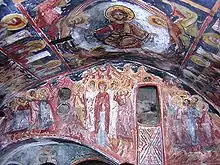
Struga is also a place of important cultural significance in North Macedonia, as it is the birthplace of the poets Konstantin and Dimitar Miladinov.
The main event of the cultural life in Struga is the world's largest poetry gathering, Struga Poetry Evenings, whose laureates have included several Nobel Prize for Literature winners such as
and many others since 1966.
There are several cultural monuments in Struga and in its vicinity such as
- the Monastery of Kališta, a few kilometers away from the town center, lying on the shore of Lake Ohrid. It is believed that it dates from the 16th century, with frescoes from the 14th and the 15th centuries.
- Another rock church is present in the neighbouring village of Radožda with frescoes from the 13th and 14th centuries.
- The Church of Sveta Bogorodica (St Mary) in Vraništa, is believed to be where Tsar Samuel was crowned.
- The church of St. George is also located in the town; built on top of Samuel's church, it has many icons from the 14th, 15th, and 16th centuries.
- Near the village of Radolishta, a basilica from the 4th century was discovered, with a mosaic.
Struga's old architecture dates from the 18th and 19th centuries.
Sports
Local football clubs FC Struga and FK Karaorman have both played in the Macedonian First Football League. A third club Vllaznimi, currently plays in the Macedonian Third League (Southwest Division).
Economy
Tourism
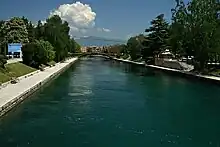
Much of the town's income is through internal tourism. Struga's location on Lake Ohrid makes it a slightly quieter and more peaceful experience than the more bustling Ohrid.
When visiting this quiet town of North Macedonia, there are a few other places that show the beauty and culture, like the clay chamber pots at the house of the Miladinovci Brothers, the old bazaar, the century-old churches and mosques.
Before the evenings you can enjoy on 3 kinds of beaches called "Male beach" (maška plaža), "Female beach" (Ženska plaža) and Galeb ("Gull Beach"), located just before the estuary of the river Crn Drim (Black Drim) in its own flow, and between the two previous beaches.
Just in front of the "Male beach", at the estuary of the river Crn Drim it is located the biggest 5 star Hotel Drim in Struga.
Out of the town there is another tourist place near the lake called Biser (Pearl), also a hotel.
Every August the Struga Poetry Evenings (SPE) are held at the "Poetry Bridge" (Macedonian: Струшки Вечери на Поезијата) and are attended by poets, writers and artists from across the world.
- Churches[24]
- St. George Church – from the 13th century;
- St. Nicholas Church
- Church of the Myrrhbearing Women
International relations
Twin towns – Sister cities
Struga is twinned with:
 Büyükçekmece, Turkey[25]
Büyükçekmece, Turkey[25] Mangalia, Romania[26]
Mangalia, Romania[26] Waterbury, Connecticut, United States[27]
Waterbury, Connecticut, United States[27]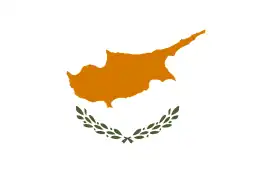 Famagusta, Northern Cyprus[28]
Famagusta, Northern Cyprus[28]
References
- Димитър Атанасов (2009) Македонска тетрадка, Изд-во "СМ", стр. 82, ISBN 9549229033.
- Ilin, Dušica (1982). The golden garland of the Struga nights of poetry. p. 326.
СТРУГА се наоѓа на западниот дел на Охридското Езеро, на 14 - иот километар од ОХРИДА. Што значи што Старото име на Струга е Енхалон, јагула. По доаrањето на Словените градот го добива името Струга, значи: корито на река STRUGA is located on the western part of Lake Ohrid, 14km from OHRID. Which means struga's old name is Enhalon, an eel. After the Slavs came, the city was named Struga, meaning: riverbed.
- Институт за национална историја (1996). Гласник на Институтот за национална историја. Vol. 40. p. 112.
- Krek, Simon; Uszkoreit, Hans (2012). The Slovene Language in the Digital Age. p. 51.
- Humar, Marjeta (2002). Planinski terminološki slovar. p. 220.
- Šašel Kos 1993, p. 119.
- Dervishi, Nebi (2005). Etnokultura e Fushëgropës së Ohrit. Tetovo: Çabej. p. 175. Retrieved 24 October 2021.
- Wilkes 1992, pp. 98–99.
- Hammond 1982, p. 265.
- Strabo, Geography (ed. H.C. Hamilton, Esq., W. Falconer, M.A.), book 7, chapter 7: "...had established their sway, and Enchelii, who are also called Sesarethii. Then come the Lyncestæ, the territory Deuriopus, Pelagonia-Tripolitis..."
- Dervishi, Nebi (2005). Etnokultura e Fushëgropës së Ohrit. Tetovo: Çabej. p. 33. Retrieved 24 October 2021.
- Dervishi, Nebi (2005). Etnokultura e Fushëgropës së Ohrit. Tetovo: Çabej. p. 24. Retrieved 24 October 2021.
- "1591 Lorenzo Bernardo: Journey of the Venetian Ambassador". www.albanianhistory.net/texts16-18/AH1591.html. Archived from the original on 2013-03-22. Retrieved 4 September 2022.
We had excellent eel and trout from Lake Ohrid, which, we were told, also produced carp. In Struga we found good wine and a caravanserai for the horses. Although they call Struga a town, it is more like a village and is the first settlement in Bulgaria after leaving Albania. Through it flows a small river (13) which is said to arise in Lake Ohrid and to be the source of the river of Lezha. One crosses a bridge separating the border between Albania and Bulgaria shortly before one enters the plain of Struga, which is almost totally cultivated and which is very fertile. The Bulgarians speak Slavic and are of Greek rite. Storks make their nests on the roofs of their houses. All the people respect the birds and believe that they bring good luck to those on whose houses their nests are built.
- "1865 Henry Fanshawe Tozer: Researches in the Highlands of Turkey". www.albanianhistory.net. Retrieved 4 September 2022.
- "STRUGA POETRY EVENINGS". svp.org.mk. Archived from the original on 2001-03-06. Retrieved 4 September 2022.
In 1961, on the occasion of the centennial of the publication of the Collection of Folk Songs compiled by the Miladinov brothers, a literary reading was held in Struga on July 15th by a group of Macedonian authors. It was then that the idea was born: a poetry festival. At one of its meetings, the National Board of the Struga district appointed the first festival council consisting of seven members. Its first president was Aco Shopov.
- Temo, İbrahim (1987). İbrahim Temo'nun İttihad ve Terakki Anıları. İstanbul: Arba. p. 5.
- Dervishi, Nebi (2005). Etnokultura e Fushëgropës së Ohrit. Tetovo: Çabej. p. 113. Retrieved 24 October 2021.
- Vasil Kanchov (1900). Macedonia: Ethnography and Statistics. Sofia. p. 252.
- Salajdin SALIHI. "DISA SHËNIME PËR SHQIPTARËT ORTODOKSË TË REKËS SË EPËRME". FILOLOGJIA - International Journal of Human Sciences 19:85-90.
- "Ethnic/religious composition of Struga district". pop-stat.mashke.org. Retrieved 22 May 2023.
- Macedonian census, language and religion Censuses of population 1948 - 2002
- Censuses of population 1948 – 2002 Archived 2013-10-14 at the Wayback Machine
- Murtishi, Kaim (2001). Ladorishti: Histori dhe Tradita. Asdreni. p. 21. "ndërsa për ruajtjen e identitetit të Strugës, flet fakti se në atë qytet, para disa dekadave, flitej vetëm dialekti toskë, sidomos toskërishtja qendrore, ndërmjet Jugut dhe Veriut të Shqiperisë... Këto fakte gjuhësore i vërteton edhe popullata rome, jevgjit e Strugës, flasin dhe këndojnë toskërisht, gjithashtu edhe popullata turke e këtij qyteti, flet dialektin toskë. Këtë dialekt e flasin vllehët e Strugës dhe të Belicës. Këtë dialekt e flet edhe popullata sllave që ka mësuar të flasë shqip."
- Jелена Павловска, Наташа Ниќифоровиќ и Огнен Коцевски (2011). Валентина Божиновска. уред (на македонски). "Карта на верски објекти во Македонија". Менора – Скопје: Комисија за односи во верските заедници и религиозните групи. ISBN 978-608-65143-2-7
- "Kardeş Şehirlerimiz". www.bcekmece.bel.tr. Retrieved 2021-09-13.
- "Orase infratite Arhive". Mangalia (in Romanian). Retrieved 2021-09-13.
- "Waterbury and Struga Agree To Become Sister Cities, O'Leary To Visit Macedonia Next Summer". The Waterbury Observer. Archived from the original on 2014-01-28. Retrieved 2014-01-23.
- "Gazimağusa Belediyesi". Gazimağusa Belediyesi (in Turkish). Retrieved 2023-05-20.
External links
- Struga Municipality
- Points of interest in Struga
 Struga travel guide from Wikivoyage
Struga travel guide from Wikivoyage- Struga Tourism Portal
.jpg.webp)
